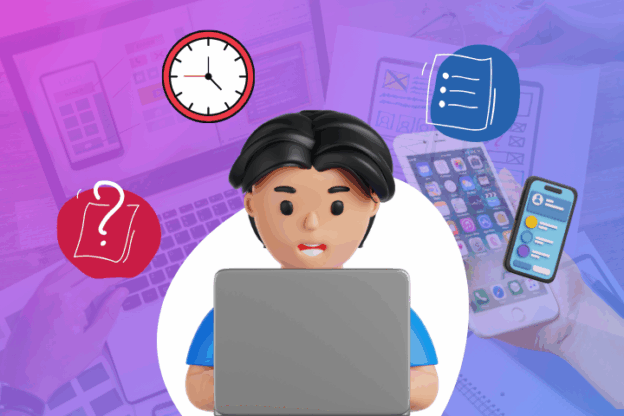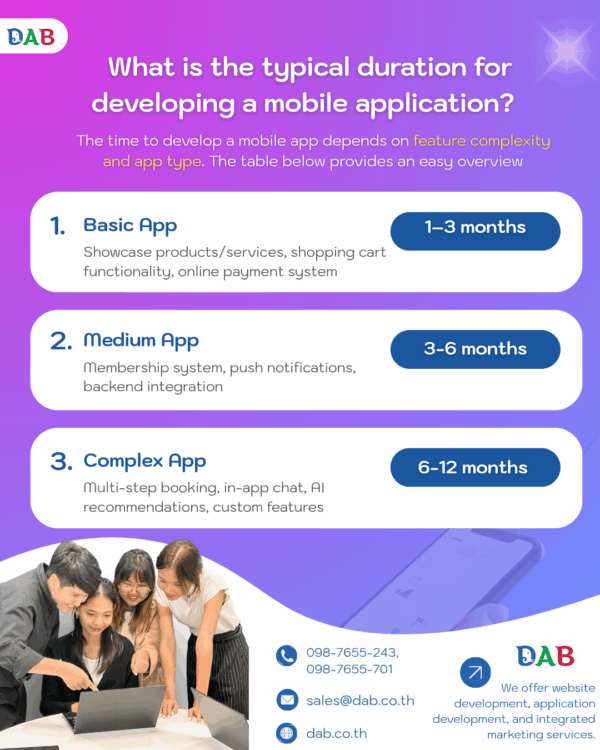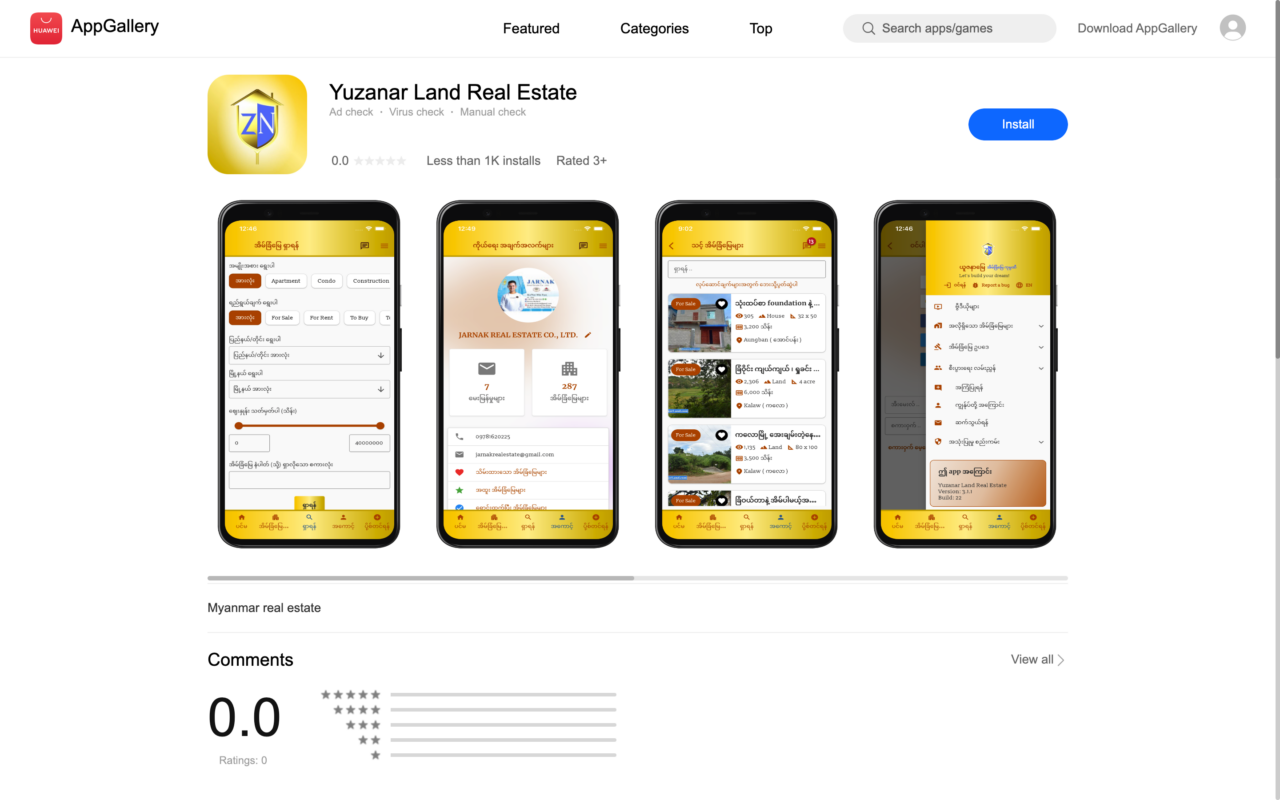How Long Does It Take to Build a Mobile App in Thailand?

Building a mobile app for your business is not just about having a great idea. It involves careful planning, from defining features to estimating development time. Many business owners often wonder, “How many months does it take to develop a mobile app?” or are unsure where to start. Understanding the timeline and development process helps you plan your budget, allocate resources, and ensure your mobile app is ready on time.
In this article, we will explore the factors that determine mobile app development time, approximate timelines for typical businesses, and tips for planning your mobile app development efficiently and successfully.
Why Your Business Needs a Mobile App
Today, many businesses, especially in e-commerce, face intense competition. Whether you sell products online or provide services, having your own mobile app is not just an extra, it has become a crucial tool for reaching customers quickly and directly.
A mobile app allows customers to access your products and services more conveniently. They can place orders without navigating multiple web pages, receive promotions or discounts directly, and use membership systems that strengthen brand recognition. Additionally, apps help businesses collect customer data and analyze usage behavior to improve services and create targeted promotions.
For e-commerce businesses websites, mobile apps increase convenience and speed in transactions, encourage repeat purchases, and build trust by presenting your business as professional and modern.
In short, a business mobile app is a vital tool that boosts sales, strengthens customer loyalty, and keeps your business ahead of competitors.
Factors That Affect Mobile App Development Time
There is no fixed timeline for developing a business mobile app because the duration depends on several key factors affecting development, testing, and deployment.
- Type of Mobile App
The type of app determines complexity and development time.
- Native App (iOS or Android): Requires separate development for each platform, increasing time and cost.
- Hybrid or Cross-Platform App: Developed once but runs on multiple platforms, reducing time and cost. Some features may still need extra customization.
- Features and Complexity
The more complex the features, the longer the development time.
- Basic App: Display products, shopping cart, online payment takes a few months.
- Full-Feature App: Membership system, push notifications, backend integration takes longer.
- Complex App: Multi-step booking system, AI recommendations, in-app chat may take 6–12 months.
- UX/UI Design
Design and user experience are critical.
- Must be user-friendly, visually appealing, and aligned with the brand.
- Multiple revisions or feedback rounds may increase development time.
- Backend and Database Integration
If the app needs to connect to a website, ERP, or customer database:
- Integration and testing require additional time.
- Incomplete data or complex systems may extend the timeline.
- Testing and Bug Fixing
Testing is a crucial step.
- All features must be verified on various devices.
- Bug fixing and improvements based on feedback and time but ensure a stable, professional app.
- Post-Launch Updates
Even after launch, apps may require feature updates or fixes.
- Planning for the first update ensures a smooth user experience.
- Preparing a development team for maintenance reduces future problems.
Estimated Timeline for Typical Businesses
The time to develop a mobile app depends on feature complexity and app type. The table below provides an easy overview:
| App Type | Key Features | Approximate Time | Suitable For |
| Basic App | Display products/services, shopping cart, online payment | 1–3 months | Small online stores, basic service businesses |
| Medium App | Membership system, push notifications, backend integration | 3–6 months | Medium businesses requiring full-feature apps and larger target audience |
| Complex App | Multi-step booking, in-app chat, AI recommendations, custom features | 6–12 months | Large businesses or those needing complex, custom-feature apps |
Note: Estimated time may vary depending on actual features, UX/UI design, and backend readiness.

For example, if you develop a real estate app, the timeline depends on desired features:
Basic App (1–3 months): Displays property listings with images and basic details like price, location, and photos. Suitable for small developers or agencies wanting to showcase properties.
Medium App (3–6 months): Includes property search by location, price, and size, plus booking or contact systems. Ideal for medium-sized real estate companies that want customers to search and book online.
Complex App (6–12 months): Features in-app chat, new property notifications, booking appointments, CRM or AI recommendations. Suitable for large real estate businesses needing advanced features and full user experience.

Tips for Planning Your Business Mobile App
- Define features and objectives clearly
Decide what type of app you want and the main features. For real estate apps, this may include search, booking, viewing appointments, or project notifications. - Choose an experienced and communicative development company
Selecting a team with experience in Thai businesses reduces communication issues and ensures timely delivery. - Set a clear timeline and milestones
Outline each phase, such as design, development, testing, and launch, to control time and budget effectively. - Prepare data and assets for the app
Logo Design, images, product/service information, backend systems, or databases help developers work quickly and accurately. - Plan for testing and improvements
A good app must undergo multiple testing rounds, bug fixes, and user feedback adjustments to ensure a smooth experience. - Be ready for post-launch updates
After launch, some feature improvements or minor fixes may be needed. Planning the first update ensures continuous, smooth user experience.
Conclusion
Developing a mobile app for your business is not too difficult if you understand the timeline, the factors affecting development, and the features required. For typical businesses, a basic app may take 2–3 months, a full-feature app 4–6 months, and a complex app 6–12 months.
The key is careful planning and choosing an experienced development team. Understanding the timeline and process helps control budget, prevent delays, and ensure your app meets customer needs.
If you are looking for experts in mobile app development for Thai businesses, Digital Agency Bangkok is ready to turn your ideas into a functional app and help your business grow professionally.
Phone: 098-7655-243 or 098-7655-701
Email: [email protected]
FAQ – Frequently Asked Questions
Q1: How many months does it take to develop a mobile app?
A1: It varies by app complexity. A basic app takes about 2–3 months, a full-feature app 4–6 months, and a complex app 6–12 months.
Q2: Do I need a website before creating an app?
A2: Not necessarily, but having a website can make data integration or backend connection easier and faster.
Q3: Should I develop for iOS or Android?
A3: It depends on your target audience. Focus on iOS if most customers use iPhones, Android if they use Android devices, or consider hybrid development for both platforms.
Q4: What information should I prepare before starting an app?
A4: Required features, user flow, logo and brand guidelines, and any backend systems or databases if available.
Q5: Is developing a mobile app expensive?
A5: Costs depend on features and complexity. A basic app can start from tens of thousands to hundreds of thousands of THB, while complex apps cost significantly more.
Q6: How can I tell if a mobile app development company is reliable?
A6: Check past projects, client reviews, clear communication, and post-delivery support services.


